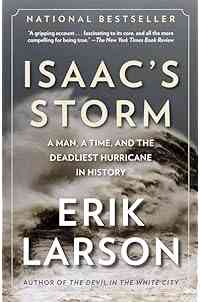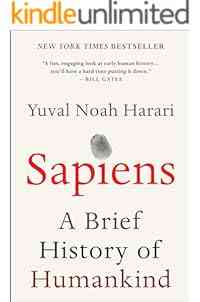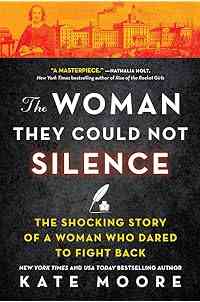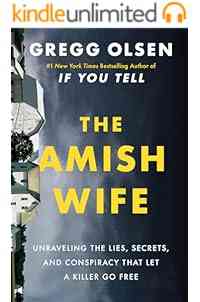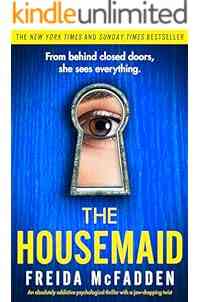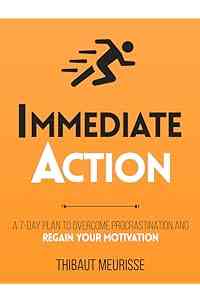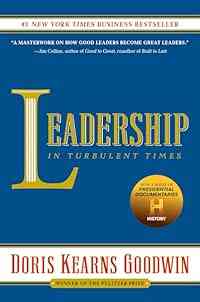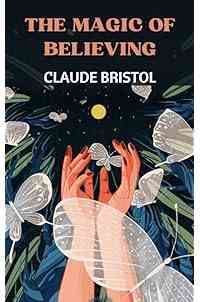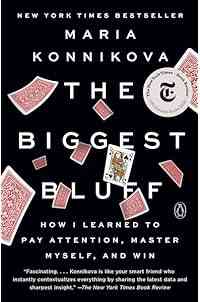
The Biggest Bluff: How I Learned to Pay Attention, Master Myself, and Win
Introduction:
In 'The Biggest Bluff', Maria Konnikova embarks on a thrilling and enlightening journey to understand the delicate balance between skill and luck, using the world of professional poker as her arena. With no prior experience in poker, she challenges herself to learn the game with the goal of competing in the World Series of Poker. Through her journey, Konnikova dives deep into the psychology of human decision-making, the importance of emotional control, and the art of reading others. Her exploration is not just about poker; it's an insightful look into how these elements intersect with life itself and the decisions we make every day.
Key Takeaways:
The Biggest Bluff (Maria Konnikova)
The Role of Skill versus Luck
Konnikova begins her poker journey with the question of whether success is a result of skill or luck. This topic explores the balance between the two, illustrating how in poker, as in life, both elements play significant roles. Konnikova learns to distinguish between what she can control (skill) and what she cannot (luck), and the realization brings a deeper understanding of how to approach not just the game, but life's challenges. She discusses the concept of resulting, where individuals judge decisions based on outcomes rather than the quality of the decision at the time it was made. Through her experiences, Konnikova illustrates the importance of focusing on improving skills and decision-making processes, rather than fixating on the uncontrollable element of luck.
Mastering Emotional Control
Emotional control, or the lack thereof, can significantly affect both poker success and personal life. Konnikova delves into the psychological aspects of poker, which require not just understanding one's own emotions but also managing them effectively to make rational decisions. She shares insights on the concept of 'tilt', a poker term for letting frustration or anger cloud judgment, leading to poor decisions. By learning to recognize the early signs of emotional distress and implementing strategies to stay composed, Konnikova was able to minimize the impact of negative emotions on her gameplay. This lesson extends beyond poker, suggesting that emotional intelligence and control are critical for success in any high-stress situation or decision-making process.
The Importance of Observation
Paying attention to and interpreting the behavior of others is a crucial skill in poker, as it can reveal valuable information about opponents' hand strength and intentions. Konnikova emphasizes the importance of observation, not just of others, but of oneself. She advocates for mindfulness and self-awareness as tools for understanding biases, patterns, and tells in one's own behavior, which can then be adjusted to improve outcomes. The ability to read others and oneself effectively demands a high level of focus and interpretative skills, underscoring the value of observation in critical thinking and decision-making.
Strategic Flexibility
Successfully navigating the world of poker requires the ability to adapt one's strategy based on the situation. Konnikova introduces the concept of strategic flexibility, highlighting its relevance to both poker and life. She learns to adjust her play style depending on the variables of each game, such as the characteristics of her opponents or the dynamics of the table. This adaptability allows her to make the most informed and strategic decisions possible, regardless of the immediate circumstances. Strategic flexibility underscores the importance of not being rigid in one's approach and the value of being open to changing tactics as situations evolve.
The Journey of Self-Discovery
Throughout her poker journey, Konnikova experiences a profound journey of self-discovery. Poker becomes a mirror reflecting her strengths, weaknesses, biases, and emotional triggers. By confronting and understanding these aspects of herself, she is able to grow not just as a player but as a person. The lessons of self-awareness, resilience, and personal growth are perhaps the most significant takeaways from her experience, demonstrating how a deep understanding of oneself is crucial for mastery in any field and for navigating life’s varied challenges.
Conclusion:
‘The Biggest Bluff’ is more than a story about poker; it’s a deeply insightful exploration of human psychology, decision-making, and personal growth. Maria Konnikova’s journey offers valuable lessons for anyone looking to improve their understanding of themselves and others, enhance their decision-making skills, and learn how to master their emotions in challenging situations. This book is particularly recommended for those interested in psychology, strategic thinking, and anyone looking for a compelling narrative that bridges the world of professional poker with life’s broader lessons. Through Konnikova's experience, readers can learn not only how to play a better game of poker but also how to play a better game of life.
